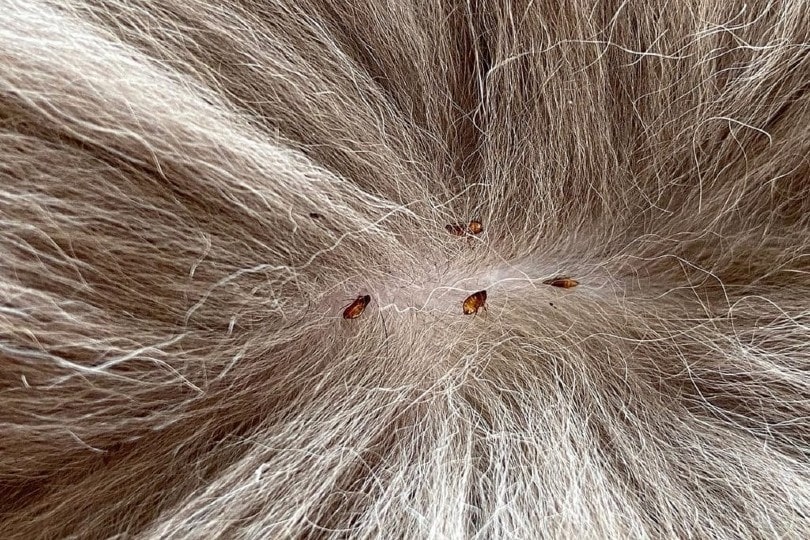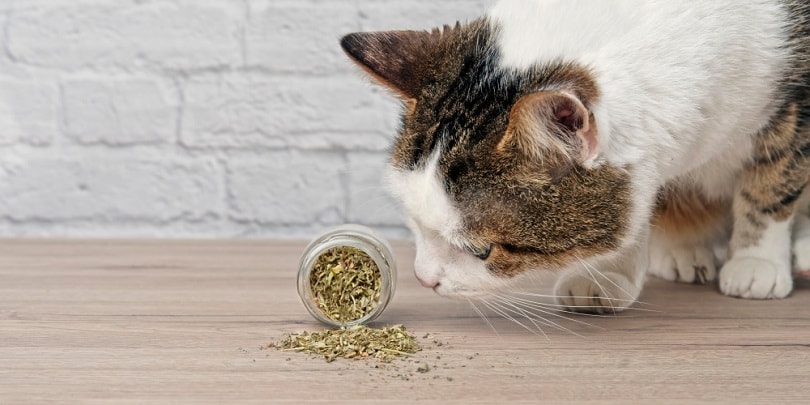
Dealing with fleas and trying to eradicate them from your pet and from your home can be frustrating and time consuming. You have to deal with flea baths, collars, and whatever else you need to do the job. So, using a natural remedy to do the job safely would be ideal, right? Would rosemary work on fleas? The answer to that is no. While rosemary can act as a deterrent to fleas, it will not remove them from your pet or home.
Let’s look at how rosemary can help, along with the overall best ways to eliminate fleas when they’ve invaded your life.
Can Rosemary Kill Fleas?
Rosemary has many excellent benefits, from adding a depth of flavor to your cooking to having antiviral, antibacterial, and antifungal properties.
When it comes to fleas, rosemary can act as a repellent, so it does have that advantage, but there is no evidence that it will remove fleas from your pet or home. When you’re trying to get rid of fleas, you also need to get rid of the eggs and larvae, and rosemary just isn’t capable of doing this.
Technically, if you sprinkled your pet with rosemary, the fleas would probably vacate, but this doesn’t change the fact that you would then have to sprinkle rosemary all over your home, every day, for about 3 months!

What Is the Best Method to Get Rid of Fleas?
Before attempting to eradicate fleas, you must first understand the flea life cycle.
Flea Life Cycle
Adult fleas attach themselves to a host, and the female lays eggs after having a blood meal. In fact, blood is a necessity for them to reproduce. Fleas can lay 40 to 50 eggs every single day!
The eggs fall off your pet and onto any surface that your pet spends time on, like bedding, furniture, and carpet. From here, the eggs hatch into larvae, and eventually pupae that form cocoons that lie dormant until the right conditions lead to the hatching of the adult fleas. These conditions are heat, vibration, light, and exhaled carbon dioxide, and the cocoons can lie dormant for many months until the environment is just right. As you can see, getting rid of fleas isn’t a quick and easy fix.
Eradicating Fleas From Your Pet
If your pet has fleas, now would be the time to schedule a visit with your vet. They can recommend a course of action, including safe treatments to use on your pets and around the home. If you’re wanting to get a head start at home, you can use a flea comb and a bowl of hot, soapy water. Dip the comb in the water, comb your pet, dip the comb in the water, and repeat! The water will drown the fleas, and the soap stops them from being able to jump out of the water.
Then, give your pet a bath with vet-approved flea shampoo. Ensure that you only use cat shampoo for cats and dog shampoo for dogs. If you are using a spot on flea treatment, be sure to thoroughly dry your pet first, and follow the product instructions about how long to wait before you can bath your pet again.

Eradicating Fleas From Your Carpet
Unfortunately, removing fleas from your pet won’t solve the flea problem. Next, you’ll need to tackle your home. Starting with any carpets, you’ll have to vacuum quite thoroughly, twice. Follow this with a product to eradicate fleas, eggs and larvae in the environment. There are numerous licensed products for this purpose, and a few home remedies as well. One effective method is to sprinkle diatomaceous earth everywhere your pet spends time and then vacuum everything up. You’ll need to read the instructions, but you typically need to let the diatomaceous earth sit for 24 to 48 hours before vacuuming. This natural product is effective at killing off pests like fleas. It’s safe to use on everything, including your furniture and your pet’s bedding.
After you’ve treated the floors, vacuum everything and throw out the bag or clean the canister thoroughly. Do this as many times as necessary.
Eradicating Fleas From Your Bedding
This step includes your pet’s bedding, and you’ll need to wash everything that can be thrown into a washing machine. You’ll need to wash sheets, pillows, and duvets on the hot water cycle.
Once everything is dry, sprinkle your pet’s bedding with a repellent. This is where rosemary can come in handy, since it is an effective repellent for fleas.
You can try grinding up rosemary and sprinkling it on, or you can make rosemary tea by steeping it in hot water for about 30 minutes (it should be strong!). Strain, let it cool, put it in a spray bottle, and spray anywhere your pet spends time.
Eradicating Fleas From Your Yard
This step might not apply to you if you don’t have a yard or pets that spend time in them, so if your pet is an indoor cat, you can probably skip this step.
Fleas thrive in moist environments, so you’ll need to remove anything that enables water to accumulate, such as pools, grass clippings, and leaf piles. Consider using cedar chips around plants and shrubs or along pathways, as these function as flea repellent. You can try planting plants that are also flea repellents, but be careful not to plant any that are toxic to cats. Catnip is a great option – it repels fleas, and your cats will love it! Rosemary is another good choice.
Finally, you can use diatomaceous earth or hire a professional to treat your lawn with insecticides that are not harmful to pets.

Flea Prevention
Even if your pet doesn’t have fleas, prevention is best so you don’t have to go through all this in the first place. Topical treatments tend to be a small vial of product squeezed between your pet’s shoulder blades, or you can opt for an oral treatment, which usually needs to be given once a month.
Some medications can be purchased at your local drugstore or online, but you must be careful about what kind you get, as it must be accurate for your pet’s species and weight. Giving a cat flea treatment formulated for dogs can be fatal, for example. And many non-prescription products are simply not very effective. It’s best to consult your veterinarian to ensure that you get the right treatment for your pet.
Conclusion
Rosemary can help to a certain degree as a repellent, but it will not kill fleas. These critters are a nuisance and can lead to serious health conditions. For example, cats can get cat scratch fever and tapeworms through flea bites.
While natural remedies can help, nothing can do the job as well as what your veterinarian will recommend. Bear in mind that the longer that the fleas are around, the more there will be to get rid of.
Featured Image Credit: Nika_Akin, Pixabay
The post Does Rosemary Kill Fleas? Effectiveness Explained appeared first on Pet Keen.




